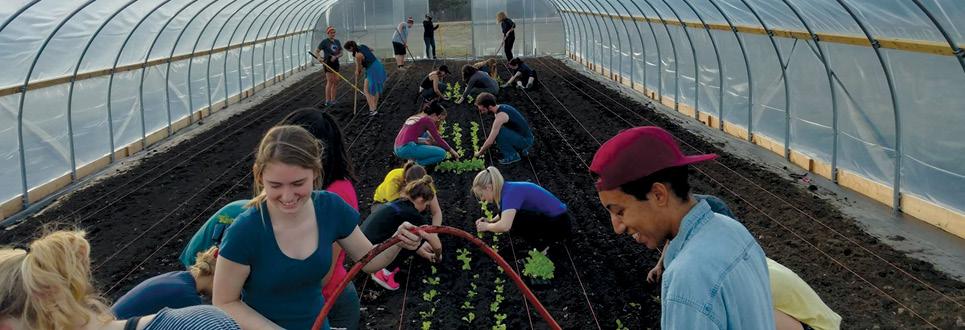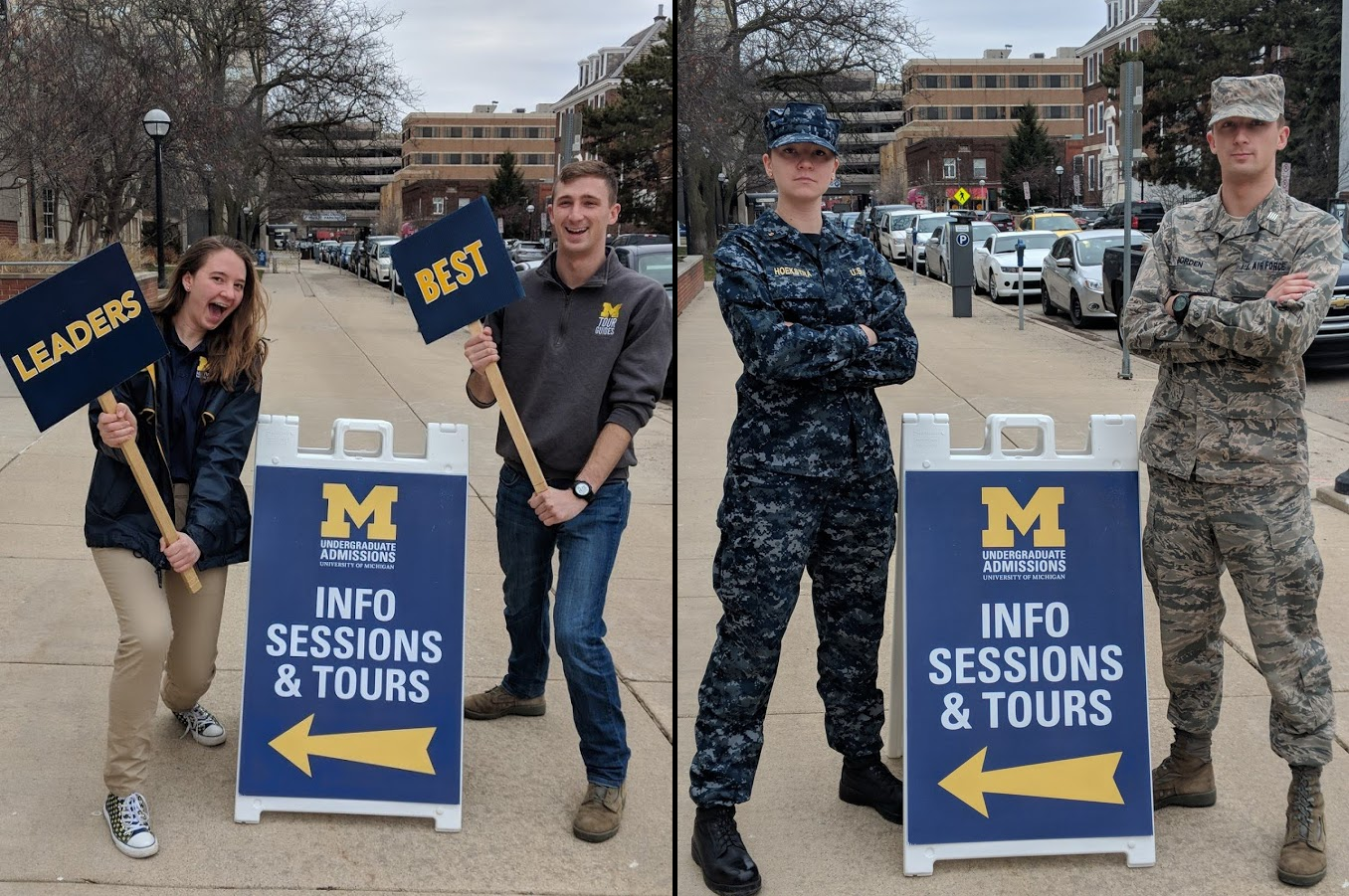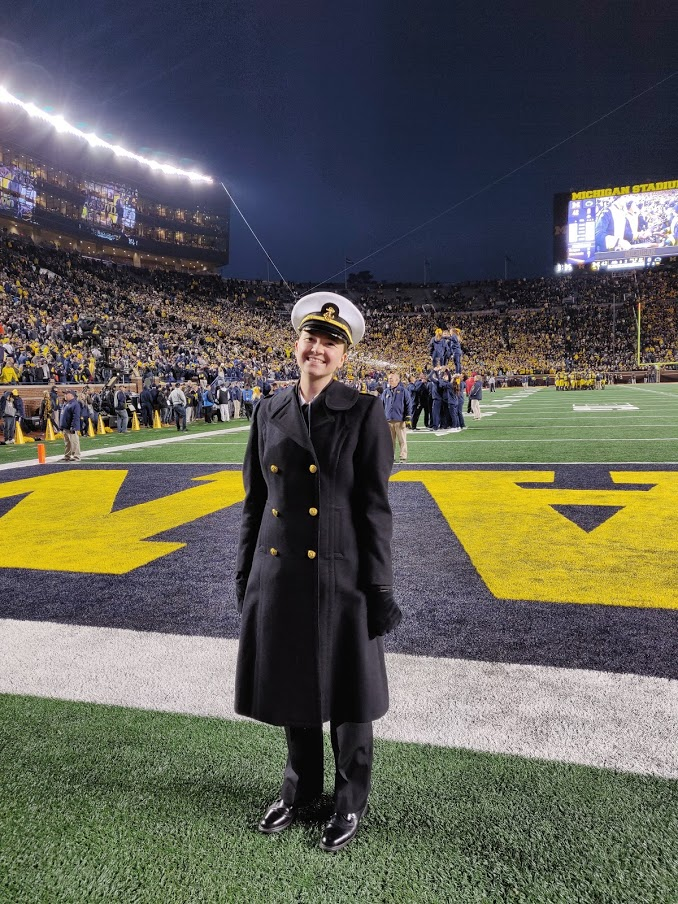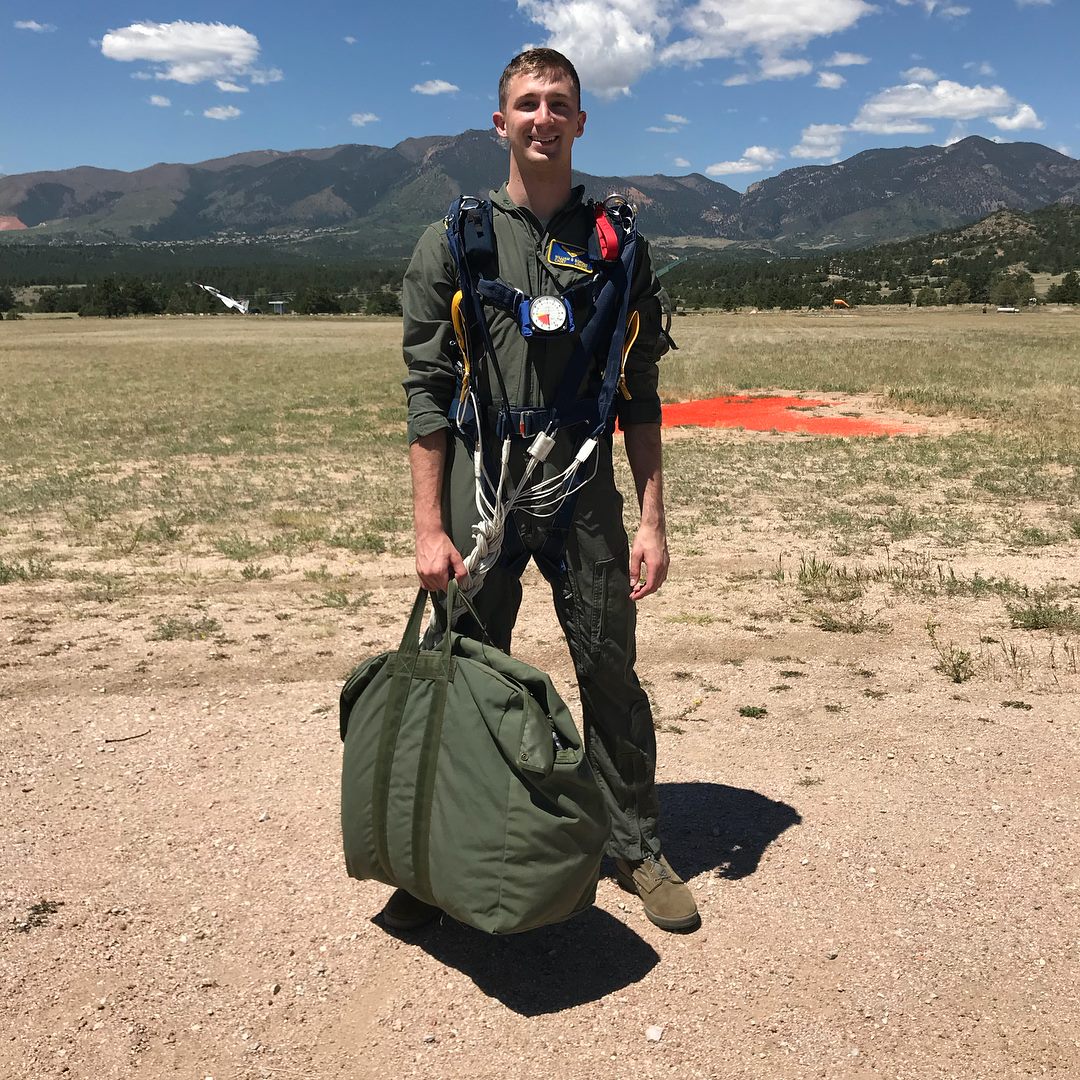Blog
Get the inside scoop about life at U-M and applying to Michigan from current student bloggers, Admissions staff, and guest faculty writers.

Get the inside scoop about life at U-M and applying to Michigan from current student bloggers, Admissions staff, and guest faculty writers.


At Michigan, it’s not uncommon to see students walking around campus in military uniforms. They’re in the Reserve Officer Training Corps, better known just as ROTC. But what exactly does that mean? What are they doing? Why are they here? What are their lives like?
As two ROTC students, and tour guides, we get a lot of questions about the ROTC program. So we’ve teamed up to give you a little peek inside our lives as ROTC students at U-M. The words here are our own thoughts and experiences and do not reflect the official stance of the Department of Defense, United States Air Force, or United States Navy.
What is the deal with ROTC?
It is a program that works to commission college students as officers in the United States Armed Forces.
Will: For the Air Force, we commission cadets as 2nd Lieutenants in the active duty Air Force. Cadets join the program with or without a scholarship and can actively work towards earning one in high school or during their ROTC career.
For cadets on a high school scholarship, they have a year to decide if they want to continue in the program without commiting. For non-scholarship cadets, they have two years to decide. Halfway through our ROTC career, usually in summer of sophomore year for 4-year cadets, we head down to Maxwell AFB for Field Training (“bootcamp”). There we train with cadets from around the country and, upon returning, help run the cadet wing as an upperclassman. Overall, everyone’s end goal is to become a 2nd Lieutenant in the world’s greatest Air Force.
Katherine: On the Naval ROTC side, we commission officers into both the Navy and the Marine Corps. The Navy and Marine Corps call their officer candidates midshipmen instead of cadets (like the Army and Air Force), but the difference is for historical reasons and really, in name only.
In the NROTC program, we have two groups of midshipmen: midshipmen who have a scholarship and those who are working to earn a scholarship. Having a scholarship means that the government pays for our tuition and fees, and gives us a book and a housing stipend. And as long as we complete all required training (which includes training during the school year and over every summer) and meet physical standards, when we graduate, we commission as either Ensigns in the Navy or Second Lieutenants in the Marine Corps; we then go on active duty for at least five years.
Why ROTC?
Will: Ever since I was a little kid, I have always wanted to serve in the military. There are pictures of me in a camo uniform with face paint running around with friends. When the time came after high school, I wasn't sure where I wanted to go to school or what my future would be; you know the common young-adult life crisis. I thought about enlisting but ruled that out. Then I looked into the military academies and senior military colleges, but I did not want my life to be 100% military all the time.
One day out of the blue, my mom told me to look into ROTC. I had no idea what ROTC was, so I did some intense Google research and saw that the scholarship period was over in a month. I quickly got my resume, letters of rec, and all the other stuff together and submitted a package to the AFROTC National Headquarters.
After a little bit of waiting, I interviewed with a local detachment and soon enough I was offered a scholarship. After thinking about the offer, I decided to take it and try ROTC out for the first year. Doing so has been one of the greatest decisions of my life.
Katherine: I was involved in a lot throughout high school (like three varsity sports, band, and AP classes) and I didn’t want to stop challenging myself when I got to college. It started when I got a postcard from the Naval Academy inviting me to go to their summer camp between my junior and senior years of high school. I did and I loved it. So I decided to apply to the Naval Academy and I was dead set on going there.
Then I got a call from the local Marine Corps recruiter asking if I wanted to talk about my options with the Marine Corps. Apparently “it’s fine, I’m going to the Naval Academy” was not what he was expecting me to say nor did that sound like a very good plan to him. He invited me to the recruiting center to talk me into applying for the NROTC scholarship, as a backup if nothing else. I obviously did and it’s probably the best choice I’ve made in my life so far.
What is your weekly schedule like?
W: Like Navy, we wear our uniforms to class one day a week on Thursday. Most of our Air Force classes are on Thursdays, but everyone has Leadership Laboratory from 0600-0800. Here the upperclassman (Professional Officer Course cadets, or POC) train the underclassman (General Military Course cadets, or GMC) on mentorship, drill, briefing practice, dorm maintenance and more. Sometimes we bring in outside resources, officers, or guest speakers to help cadets see what career option suits them best.
We are required to work out twice a week from 0700-0800. This is nice because then you have already worked out before most people have gotten out of bed. Any outside ROTC activities usually meet once a week later in the day, such as our honor and service society, (Arnold Air Society), or Drill Team. Surprisingly, there is a lot of free time. I still work jobs, and have joined organizations on campus like a typical U-M student.
 K: We wear our uniforms to class one day a week, Tuesday, and we also have our leadership lab/drill that afternoon. That time is for our general leadership and military development and could take the form of general military training (GMT), close order drill, public speaking, battle scenarios, small unit leadership evaluations (SULE), sailing, or listening to guest speakers, to name just a few.
K: We wear our uniforms to class one day a week, Tuesday, and we also have our leadership lab/drill that afternoon. That time is for our general leadership and military development and could take the form of general military training (GMT), close order drill, public speaking, battle scenarios, small unit leadership evaluations (SULE), sailing, or listening to guest speakers, to name just a few.
We have physical training (PT) twice a week with the whole battalion from 0550-0700, three times a week if you are a Marine option, and every morning for those who need or want to improve their fitness. We can also sign up to wake up early more often (if you are a motivated midshipman) if we want to do things like participate in our close order drill team or get trained in the Marine Corps Martial Arts Program (MCMAP).
I apologise for the number of abbreviations and acronyms, but it’s just part of life in both college and the military.
We also have numerous opportunities to volunteer in the community each week, whether it’s visiting veterans at the local VA hospital and kids at Mott’s Children's Hospital, raising the flag, or carrying the colors at Michigan sporting events. Despite all of the activities that we have during the week, there’s still enough time for me to be in a sorority, religious group, band, and to work as a tour guide!
How do your academics change when you’re in ROTC?
W: I’m a political science major and Spanish language, literature and culture minor. The only difference between me and others on similar paths is that I have to take Air Force classes taught by Air Force officers. The classes first focus on the culture and history of the Air Force. Once you become an upperclassman, you start to focus on leadership and management as it applies to life as an officer. The courses are also very applicable to your everyday life and student leadership in clubs around campus.
Finally, you finish up with “American Culture and the Air Force,” which involves a lot of current events happening domestically and internationally, as well as the analysis of civilian control of the military and geopolitical dynamics. Overall, it is 16 credits.
During the summer, you have time to study abroad either through ROTC with Project Go or through the College of Literature, Science, and the Arts though CGIS. I studied abroad in Spain through CGIS during the summer of 2017 and also learned how to jump out of an airplane five times at the Air Force Academy in the summer of 2018.
K: I have a major (physics!), like any other student, which is a question I get a lot. Really the only difference is we have to take Naval Science classes every semester.
Naval Science class topics range from leadership and management to Naval history to navigation and ship systems to ethics; we learn important tools to prepare us for the challenges of the fleet. We also have a few extra requirements, like taking physics and calculus for Navy options, but most of those are classes I was going to have to take anyway as a physics major.
Our American history/military policy and regional studies requirements are a little harder to fit into my schedule, but I was able to find classes that fulfill university requirements too. We also are required to keep a certain GPA, but you don’t get dropped from the program unless you’re under a 2.5 - you just get mandatory study hours.
We also have most of our summers to do the same thing that other students do; for example, I had an internship at Lawrence Livermore National Lab this summer, while my midshipmates are studying abroad, taking summer classes, or working. We do have to carve out about a month of our summer to go on “summer cruise,” our opportunity to get out in the fleet: on ships, submarines, planes, or with Marine/SEAL/EOD personnel.
What is your favorite part of ROTC? Least favorite part?
W: My least favorite part is definitely waking up early. You never really get used to it, but you do get good at taking naps.
My favorite part is definitely everyone I have met because of ROTC. I met all of my friends here at Michigan as well as across the country via summer field training. Everyone has something to offer to help you grow as a person and a leader. The military provides you with an amazing extended family and that's something that I take for granted.
K: I already talked about why I joined, but I stayed because of the people. The people who voluntarily pledge to serve our country are some of the most interesting and diverse people I have ever met.
I also love that ROTC gives me a goal and a direction in college. I feel like a lot of people get a little lost in college: they don’t know what they want to major in, they don’t know what they want to do with their lives. And that’s fine; college is the time to sort that all out. But I have an extra five years to figure that out.
I don’t know what I want to do after the military, but I do know for now, I have to graduate on time, keep my grades up, stay fit, and develop myself as a leader in order to commission as the best officer that I can be when I graduate, which keeps me motivated even when I don’t want to be. And like Will, I also hate waking up early.
 What are the coolest things that you have done with ROTC?
What are the coolest things that you have done with ROTC?
W: Some of the coolest opportunities we get as cadets include: going onto the field for footballs games and holding the flag while A-10’s fly over you; running up and down all of the steps of the Big House; and my personal favorite, free flight training. I got to fly a small Cessna 172M, and it changed my perspective of flying. The Big House seemed like the Small House from 5,000 feet in the sky.
This past summer, I went to the Air Force Academy and jumped out of airplanes through their Freefall (Skydiving) program. It was definitely life changing seeing the world at 4,500 feet in the sky. Other optional activities include going to active duty Air Force bases through Operations Air Force, getting hands-on engineering experience through the Advanced Course in Engineering (ACE), and many more! We even had a cadet do an exchange program and take classes at the Air Force Academy during the fall semester. And nothing beats a guaranteed job after graduation.
K: After our freshman year, we all do something called CORTRAMID (Career ORientation and TRAining for MIDshipmen; it’s a stretch, but I didn’t name it) and it is literally the best summer camp I’ve ever been to, and I got paid to do it. It’s designed to show midshipmen the main career options the Navy and Marine Corps offer, all in one month, broken into four one-week sessions (surface, submarines, aviation, and Marine Corps), which turns into letting 400 midshipmen do the coolest things the leadership can think of.
I went underway on a ship and a submarine, flew in planes and helicopters, repelled down towers, got gassed, shot guns (and had guns shot at me), saved a mock engine room from flooding, talked to a whole lot of sailors and marines about what life in the fleet is really like, and bonded with my peers from other schools. Needless to say, it was awesome!
What are the differences between the branches?
W: Well CLEARLY the Air Force is the smartest, bravest, and hardest working branch in the US Military. But besides the inter-service rivalry that exists between all of the branches, at the end of the day, we are not all that different. We do like to poke fun at each other though, much like a sibling rivalry within a large family. But all of us volunteer to serve our country and value hard work, leadership, community engagement, and putting service before ourselves.
The differences only start to come to light when you look at the specific missions of each branch. For example, the Air Force Mission is to “Fly-Flight-Win, in Air, Space, and Cyberspace.” We wouldn’t do so well if we were put in a submarine, unless it was a flying submarine. That would be awesome. We mainly focus on the “Air” aspect of our mission, with over 5000+ aircraft, but we also have Special Forces (Battlefield Airmen), Cyber Operations, and even a tugboat!
K: Alright, whatever, Chair Force. We actually have options that don’t involve sitting in chairs. Did you know the largest air force in the world is the United States Air Force; the second largest is the United States Navy? Yeah, and we launch our planes off ships. Just sayin... But really, we are all “One Team - One Fight,” which is pretty darn awesome.
As future officers, we all are tasked with leading sailors, marines, airmen, and soldiers, but beyond that, different missions lead to different focuses (the Navy’s is “maintain, train and equip combat-ready Naval forces capable of winning wars, deterring aggression and maintaining freedom of the seas.”). In the Army and Marine Corps, it is more about people skills; the focus is on leading your people into battle or supporting those in the battle. In the Navy, there’s a heavier focus on technical skills such as running and taking care of a ship, sub, and a plane. The Air Force is similar in that they have to take care of the planes, but they also do more on the research and development side than the other branches. But they all come together into the greatest fighting force that the world has ever seen.
What do you want to do in the military?
W: I got picked up to be a pilot! Hopefully I’ll get to fly C-17’s. I’m excited!
K: Submarines once, submarines twice. Seriously, subs are so cool.
What do you want to do after the military?
W: I plan on entering public service, but honestly I have no idea. Who knows? I might stay in the military.
K: I have no idea. That’s kind of why I’m in the military; it will give me an amazing background for almost anything else that I would want to do in my life.
So are you like actually secret ninjas?
Yes, yes; we are and we can't say anymore.

Will Borden is an Air Force cadet and senior majoring in political science and minoring in Spanish the College of LSA. He originally hails from Chagrin Falls, OH. A fun fact about Will: he has jumped out of more airplanes than he has flown.